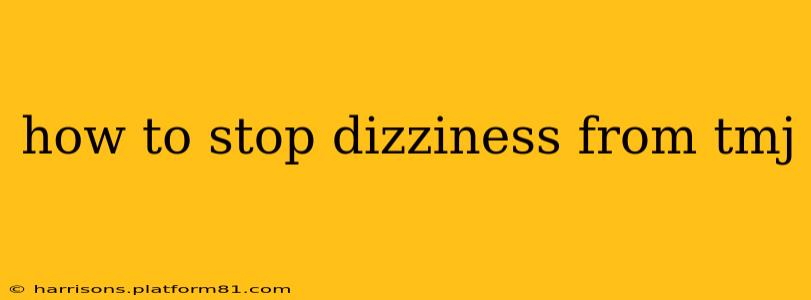Temporomandibular joint (TMJ) disorder can cause a wide array of symptoms, and dizziness is a surprisingly common one. This feeling of vertigo or lightheadedness can significantly impact your daily life, making even simple tasks challenging. Understanding the connection between TMJ and dizziness is the first step to finding relief. This comprehensive guide explores the relationship, common causes, and effective strategies to manage and potentially eliminate dizziness stemming from TMJ.
What is the Connection Between TMJ and Dizziness?
The intricate network of nerves and muscles surrounding the TMJ connects to the inner ear and brain stem. Problems with the TMJ, like inflammation, misalignment, or muscle spasms, can affect these nerves, leading to dizziness. This isn't a direct, always-present connection; the dizziness is often a secondary symptom resulting from the underlying TMJ dysfunction. The exact mechanism isn't fully understood, but several theories exist, focusing on the interplay of the vestibular system (balance), the cervical spine (neck), and the TMJ itself.
Why Does My TMJ Cause Dizziness?
Several factors can contribute to the dizziness experienced by individuals with TMJ disorders. These include:
-
Muscle Imbalances: Tight or strained jaw muscles can put pressure on surrounding structures, impacting the nerves that control balance and spatial orientation. This muscle tension can also radiate into the neck and upper back, further contributing to dizziness.
-
Inflammation: Inflammation of the TMJ can irritate nearby nerves, leading to sensory disturbances that manifest as dizziness. This inflammation can also impact blood flow, potentially leading to reduced oxygen supply to the brain.
-
Misalignment: If the jaw joint is misaligned, it can affect the position of the cervical spine and disrupt the normal biomechanics of the head and neck, interfering with balance.
-
Cervical Spine Involvement: TMJ problems frequently coexist with issues in the upper cervical spine (neck). Problems in this area can directly affect the nerves that contribute to balance and spatial orientation.
-
Inner Ear Problems: While not always directly caused by TMJ, some individuals with TMJ disorders may experience inner ear issues (like vestibular neuritis or Meniere's disease) that exacerbate dizziness. This highlights the importance of a comprehensive diagnosis.
How Can I Stop Dizziness from TMJ?
Managing dizziness related to TMJ requires a multi-faceted approach. Here are some effective strategies:
1. Medical Diagnosis and Treatment:
What kind of doctor should I see for TMJ dizziness? A consultation with your primary care physician or a dentist specializing in TMJ disorders (orthodontist, oral surgeon) is crucial for a proper diagnosis. They may also recommend referral to an ENT specialist (ear, nose, and throat) to rule out other causes of dizziness. A comprehensive examination, including a physical exam and possibly imaging studies (X-rays, MRI), is essential to identify the underlying cause of the dizziness and guide appropriate treatment.
2. Medications:
Your doctor might prescribe medications to help manage the symptoms of TMJ and associated dizziness. These may include:
-
Pain relievers: Over-the-counter NSAIDs (like ibuprofen) or prescription pain medications can help reduce pain and inflammation.
-
Muscle relaxants: These medications can help relax the jaw muscles, reducing tension and potentially alleviating dizziness.
-
Anti-anxiety medications: In cases where anxiety worsens TMJ symptoms and dizziness, medication may be helpful.
Does TMJ cause dizziness and nausea? Yes, nausea can sometimes accompany TMJ-related dizziness. Medications addressing pain and muscle tension can also help alleviate nausea.
3. Physical Therapy:
A physical therapist experienced in TMJ can teach you exercises and stretches to improve jaw mobility, reduce muscle tension, and improve posture. This approach focuses on restoring proper biomechanics and reducing the strain on the TMJ and surrounding structures.
4. Lifestyle Modifications:
Certain lifestyle adjustments can significantly reduce TMJ symptoms and associated dizziness. These include:
-
Stress management: Stress can exacerbate TMJ, so incorporating stress-reduction techniques like yoga, meditation, or deep breathing exercises is beneficial.
-
Improved posture: Maintaining good posture can help alleviate neck and jaw tension, reducing the likelihood of dizziness.
-
Dietary changes: Avoiding hard or chewy foods can lessen the strain on the jaw joint.
-
Sleep posture: Sleeping on your back with a supportive pillow can help maintain proper jaw alignment.
5. Dental Appliances (Splints or Mouthguards):
Your dentist may recommend a custom-fitted splint or mouthguard to help realign the jaw and reduce the strain on the joint. These appliances can provide significant relief from both TMJ pain and associated dizziness.
6. Other Therapies:
Depending on the severity and cause of your dizziness, other therapies may be considered, such as:
-
Acupuncture: Some individuals find relief from TMJ pain and dizziness through acupuncture.
-
Massage therapy: Massage can help relax tense jaw muscles and improve blood flow.
When to Seek Immediate Medical Attention
While many cases of TMJ-related dizziness can be managed effectively with conservative treatments, seek immediate medical attention if:
- Your dizziness is sudden or severe.
- You experience loss of consciousness or balance.
- You have a headache accompanied by dizziness.
- Your symptoms worsen significantly.
Remember, this information is for general knowledge and shouldn't replace professional medical advice. Always consult with a healthcare professional for diagnosis and treatment of TMJ-related dizziness. They can create a personalized plan to address your specific needs and help you regain your balance and well-being.
